Dante Carver discusses acting, growing up and that SoftBank role
”I always refuse the silly foreigner job. Like I said, I don’t want to get typecast. I try and stick to that rule. Those are the jobs I won’t do.”
Those living in Japan and owning a television have no doubt seen the SoftBank commercials revolving around the life of an atypical Japanese family that features a dog as the head of the household and a bespectacled foreigner.
The foreigner is Dante Carver, who recently replaced Kimura Takuya as the most popular male TV commercial actor. Takuya had held the position for eight consecutive years. Carver’s popularity is surprising to some, but upon meeting the 33-year-old at his management office, it’s not difficult to see why he is so liked. Carver is chatty, friendly, laid back and driven for success.
 Starting his acting and modeling career in Japan, doing extra work in B films and appearing in posters, Carver is now on several commercials, as well as the Be Ponkiki show on the BS Fuji television channel. Lately, he has also starred in films such as Kaze ga Tsuyoku Fuiteiru, Kansen Rettou and Darling ha Gaikokujin.
Starting his acting and modeling career in Japan, doing extra work in B films and appearing in posters, Carver is now on several commercials, as well as the Be Ponkiki show on the BS Fuji television channel. Lately, he has also starred in films such as Kaze ga Tsuyoku Fuiteiru, Kansen Rettou and Darling ha Gaikokujin.
His interest in acting started from childhood, after a missed opportunity to appear on Sesame Street. “When I was about 4 years old, I had an audition for Sesame Street and I passed. But my family ended up moving to Europe, so I couldn’t take the job,” Carver says. “I’ve been interested in TV and movies since I was a kid.”
As a child, Carver moved around a lot due to his parents work – his mother was a government nurse and his father was a multilingual interpreter and translator. This led to the family moving every couple of years, and meant Carver attended cosmopolitan schools and saw a lot of the world. Because of this, coming to Japan’s “exotic” shores wasn’t much of a hurdle for Carver.
The actor first came to Japan for a short period after being invited by university friends, and within a month he was picked up by four agencies. Upon his return, he found his 18 months filled with back-to-back auditions, and he has appeared in a constant stream of ads and shows ever since.
However, he says, being a foreign actor in Japan is not as easy as it sounds.
“There are cultural differences, there are sometimes things that come up that I don’t understand because I didn’t grow up here,” Carver explains. “So I’m still learning. Language-wise, I find that reading my dialogue or listening to the people around me helps.”
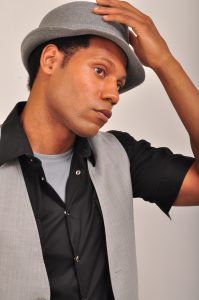 “All the jobs are difficult in their own ways,” Carver says. “Kansen Rettou was difficult to act in. The director wanted me to be as flat as possible and that was really hard. If you watch the movie toward the end, when I’m yelling for someone and it sounds so normal. That was hard.
“All the jobs are difficult in their own ways,” Carver says. “Kansen Rettou was difficult to act in. The director wanted me to be as flat as possible and that was really hard. If you watch the movie toward the end, when I’m yelling for someone and it sounds so normal. That was hard.
“Location wise, it was fantastic. It was shot in the Philippines. I loved it. It was 30 or 40 minutes south of Manila by plane. But otherwise, the most difficult job was the movie I just finished, and that was mainly because of scheduling. We only got to sleep three to four hours every day. And eventually it catches up with you.”
Then there is the typecasting. In an industry notoriously image-fixated, film and advertising is linked, and much of the time the product or the person doesn’t matter as much as the image.
“People were afraid to hire me because my image is closely associated with SoftBank. But I’m an actor. It’s my job to make sure that doesn’t happen.”
“I worked with a director who – let’s just say he is a nice guy but he takes some getting used to. He liked to joke about the SoftBank commercials a little too much and I didn’t really appreciate it. I’m still a professional just like everyone else here. And I think I voiced it too much, so some scenes were cut, but what can you do?”
However, while there are difficulties, the job definitely has its perks. Aside from the rumored famous girlfriend (Vivi model Akiko Matsumoto), the most recognizable celebrities are often treated well by agencies in Japan.
Recently, Carver was on a SoftBank commercial – a collaboration between B Ponkiki and SoftBank – which saw him travel from Thailand to Kathmandu and on to Everest over the course of a month.
“The back story to this,” Carver says with a grin, “is that I wanted to climb Mt. Fuji for three consecutive years, and every single year when I schedule it, a job would come up that I would have to take. This time, my employers came up to me and said, ‘We are sorry you had to cancel. What can we do to make amends?’”
“Sarcastically, I was like, ‘send me to the Himalayas.’ And a week and a half later, I kid you not, they came to me and said ‘Dante, great news, you are going to the Himalayas.’ Slowly I have been getting more chances and I appreciate it. I guess that means I’m doing something right!”
“I just finished a project yesterday, which was really satisfying as a job. Its working title is Pancakes and I can’t give away many details about the story just yet. It’s a sort of typical guy-meets-girl story, but it deals with three specific characters and how they interact with each other. It’s about how their interactions have consequences and sometimes makes things better. And there are little bits of comedy too. It’s a good mix. A dramedy?”
Aside from the opportunities that Japan offers, Carver also makes Japan home because of the people around him: his family-like management agency, and his friend, who he collaborates with on scriptwriting projects.
However, that doesn’t stop Carver from getting the odd bout of homesickness, and upon going to San Diego for a comic convention he was pained to leave. “When I got there I was like, ‘Man, I don’t want to leave!’ I was where I wanted to be industry-wise and around that kind of energy.
“Another couple of weeks or a month would have been perfect. I was around that kind of energy and I wanted to learn more. I’m a sponge and I want to keep learning.”
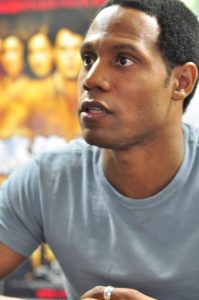 Away from acting, Carver is working on a graphic novel, a photo book on architecture and scenery, and collaborating on a sci-fi action game. “We have to work on the gameplay and design. Design is the most difficult. You can create any story you like but it can look really bad, and no matter how you make it, it still needs to be converted into computer graphics.”
Away from acting, Carver is working on a graphic novel, a photo book on architecture and scenery, and collaborating on a sci-fi action game. “We have to work on the gameplay and design. Design is the most difficult. You can create any story you like but it can look really bad, and no matter how you make it, it still needs to be converted into computer graphics.”
“I try to stay busy. I want to be as marketable as possible and do as much as I can. I want to enjoy my life, it’s not so much the money – I want to do more. People don’t really understand that. They’re like, ‘why you are doing that? You’re an actor!’ It’s like, yeah but I have passions in many different divisions.”
Carver in the meantime is striving for a schedule divided equally between Japan and other countries, and has dreams of working for network TV in Hollywood. He also has aspirations to work in as many genres of cinema as possible.
On success in Japan, Dante tell us, “Keep an open mind because the culture is different and the acting style is different. And this goes back to cultural difference. If you watch TV dramas in Japan, a lot of the focus tends to be on facial expressions only, whereas overseas they focus on body movement and body expressions. That is difficult to adapt to. Also, stay positive and stay focused. Literally separate yourself from everyone and everybody and come back. You have to do that, otherwise you get burnt out.
“I don’t see myself as successful, but when I do, you are definitely going to know!”
Story by Manami Okazaki
Photos by Daisuke Takahashi
From J SELECT Magazine, November 2010






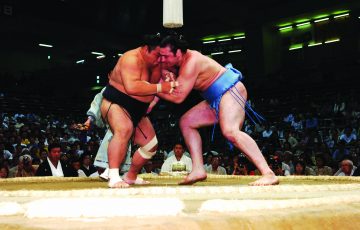
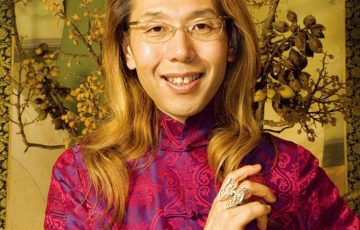

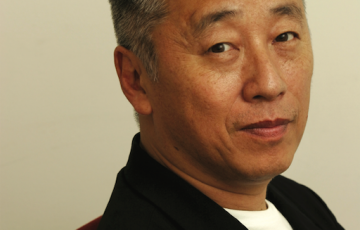
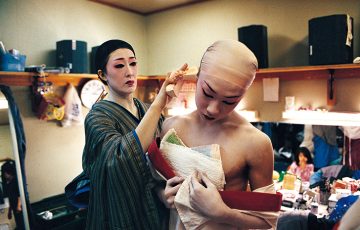
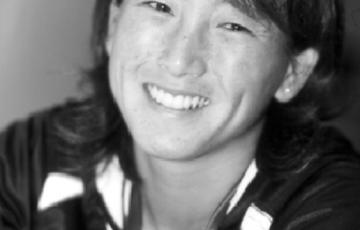
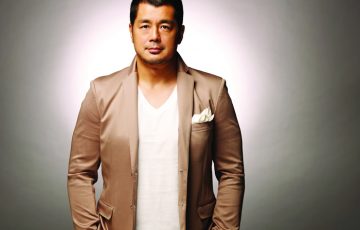


Recent Comments